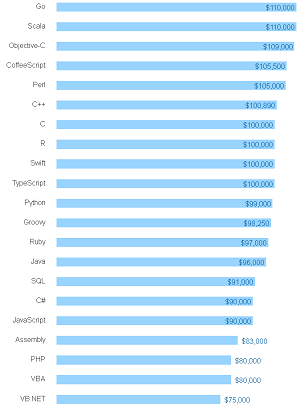News
Devs Who Program in Go, Scala Get Highest Pay, Says Stack Overflow
- By David Ramel
- August 18, 2017
Stack Overflow, analyzing data from its huge developer survey, has concluded that Go and Scala skills pay off the most in the U.S.
The coding Q&A site sifted through responses from more than 64,000 developers in its latest survey, which otherwise saw JavaScript dominate many categories, including most commonly used programming language.
But on the pay scale, JavaScript and other popular languages that typically top popularity surveys -- such as Python and Java -- are far down the list.
Instead, lesser-used languages draw the highest U.S. salaries, which in turn is prompting more developers to learn and use them.
The link between high pay and increased popularity is nowhere more apparent than with Go and Scala, topping the pay chart at $110,000:
- Go -- $110,000
- Scala -- $110,000
- Objective-C -- $109,000
- CoffeeScript -- $105,000
- Perl -- $105,000
- C++ -- $100,890
- R- $100,000
- Swift -- $100,000
- TypeScript -- $100,000
- Python -- $99,000
"One thing we learned this year is that some of the fastest growing technologies are also the highest paying languages," Stack Overflow's Rich Moy said in a blog post on Friday.
In fact, the rate of growth for those languages from 2009 to this year was about 1,200 percent.
"Languages like Go and Scala might not sound familiar to you, but they command higher salaries for a reason," Moy said. "Although the types of programmers who are ambitious enough to learn these technologies are often paid well, newer and more established companies alike have incorporated both as integral parts of their tech stacks."
 [Click on image for larger view.]
Top Paying Languages in the U.S. (source: Stack Overflow)
[Click on image for larger view.]
Top Paying Languages in the U.S. (source: Stack Overflow)
On most popularity indices, Go and Scala typically don't rank nearly so high. In the latest
TIOBE Index, for example, Go came in at No. 16, while Scala didn't make the top 20.
Go, often called "Golang" because of its generic name, is an open source, cross-platform language originally developed by Google about seven years ago. It's compiled, concurrent, imperative and structured, used for a variety of tasks including Web development, block-chain, system or back-end programming and cloud infrastructure, among many others.
"Go is expressive, concise, clean, and efficient," its documentation says. "Its concurrency mechanisms make it easy to write programs that get the most out of multicore and networked machines, while its novel type system enables flexible and modular program construction. Go compiles quickly to machine code yet has the convenience of garbage collection and the power of run-time reflection. It's a fast, statically typed, compiled language that feels like a dynamically typed, interpreted language."
Scala, on the other hand, was derived from Java and runs on the JVM (or browser JavaScript with Scala.js). It's object oriented but supports functional programming. Its open source repository is on GitHub. It's often used for Big Data analytics and building large, stable systems.
Stack Overflow's conclusion that the two languages garner higher salaries exactly mirrors a study last year from PayScale Inc. and Millennial Branding. "Scala and Go are the emerging skills with the biggest pay boosts (22.2 percent and 20 percent respectively)," the study said. "Both Scala and Go are considered to be emerging skills -- skills that have become high in demand in the past five years. They're also, notably, [Science, Technology, Engineering, and Math] STEM skills, an indicator that highly skilled STEM employees are in demand, and STEM jobs consequently command higher salaries."
That gives credence to the finding of Stack Overflow, which earlier came up with the more dubious -- and perhaps tongue-in-cheek -- claim that developers who indent their code with spaces make more money than those who use tabs.
While Stack Overflow's focus on Go and Scala related to U.S. salaries, the situation was different on a global scale, where salaries average out to be much lower. Worldwide, the rankings were:
- Clojure -- $72,000
- Rust -- $65,714
- Elixir -- $65,000
- F# -- $64,516
- Go -- $64,516
- Perl -- $63,068
- Groovy -- $61,809
- Ruby -- $60,000
- Scala -- $60,000
- R -- $57,125
About the Author
David Ramel is an editor and writer at Converge 360.